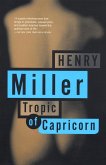Tropic of Cancer redefined the novel. Set in Paris in the 1930s, it features a starving American writer who lives a bohemian life among prostitutes, pimps, and artists. Banned in the US and the UK for more than thirty years because it was considered pornographic, Tropic of Cancer continued to be distributed in France and smuggled into other countries. When it was first published in the US in 1961, it led to more than 60 obscenity trials until a historic ruling by the Supreme Court defined it as a work of literature. Long hailed as a truly liberating book, daring and uncompromising, Tropic of Cancer is a cornerstone of modern literature that asks us to reconsider everything we know about art, freedom, and morality.
'At last an unprintable book that is fit to read' Ezra Pound
'A momentous event in the history of modern writing' Samuel Beckett
'The book that forever changed the way American literature would be written' Erica Jong
Henry Miller (1891-1980) is one of the most important American writers of the 20th century. His best-known novels include Tropic of Cancer (1934), Tropic of Capricorn (1939), and the Rosy Crucifixion trilogy (Sexus, 1949, Plexus, 1953, and Nexus, 1959), all published in France and banned in the US and the UK until 1964. He is widely recognised as an irreverent, risk-taking writer who redefined the novel and made the link between the European avant-garde and the American Beat generation.
Dieser Download kann aus rechtlichen Gründen nur mit Rechnungsadresse in A, B, BG, CY, CZ, D, DK, EW, E, FIN, F, GR, HR, H, IRL, I, LT, L, LR, M, NL, PL, P, R, S, SLO, SK ausgeliefert werden.
?Here is a book which, if such a thing were possible, might restore our appetite for the fundamental realities." ?Anais Nin
?American literature today begins and ends with the meaning of what Miller has done." ?Lawrence Durrell
?One of the most remarkable, most truly original authors of this or any age." ? Saturday Review
?Undeniably salacious but nevertheless serious and important literature, Miller's novel with its ribald sexuality still provokes (and makes feminist hairs stand on end.)" ?Victoria A. Brownworth, The Baltimore Sun









